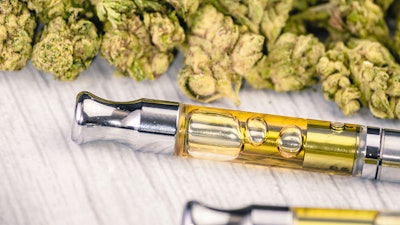
California cannabis regulators revoked a manufacturer’s license and issued an embargo for all of its integrated vaporizers and vape cartridges on Oct. 16, claiming the company couldn’t guarantee its operations were within the realm of the regulated market.
K.U.S.H. (Kinder Understanding Sensitive Healing) Collective “failed to demonstrate that cannabis products attributed to being manufactured on the licensee’s premises were in fact cultivated, processed, manufactured, packed, or held in a location duly licensed,” as required under state law, according to the California Department of Cannabis Control (DCC).
Under California’s Medical and Adult Use Cannabis Regulation and Safety Act (MAUCRSA), which was implemented after voters passed Proposition 64 in the November 2016 election, licensed adult-use cannabis manufacturers can only obtain cannabis or cannabis extracts that are supplied from the regulated market under the DCC’s authority.
All cannabis in California’s regulated cannabis market is tracked using tags with unique identifier (UID) numbers.
“DCC has probable cause to believe the products included in this notice of embargo may be adulterated or misbranded, posing a potential risk to consumers,” according to the department’s Oct. 16 notification.
The vape cartridges and integrated vaporizers manufactured by KUSH Collective and included in the embargo were sold under the following brand names: Backpackboyz, Circles, Cloud, Cure Injoy, DabGo, Everyday, High 90’s, Hollowtips, Mr. Nice Guy, Pow Wow, Supherb, and The Marathon Cultivation.
The department listed 194 products by these brands that are now embargoed.
The DCC notified owners David Shin and Jimmy Shin on Oct. 15 of the provisional license revocation for the KUSH Collective manufacturing facility in Van Nuys, Calif.
This revocation notice comes after DCC staff members conducted an on-site inspection of the KUSH Collective manufacturing premises on Aug. 30 and observed nearly 122 pounds of fresh, frozen cannabis that was without an affixed UID package tag, according to the DCC.
“The cannabis was not labeled with required UID numbers and was not located in the track and trace system and is untraceable to a licensed source,” Compliance Division Chief Nadalie Meadows-Martin wrote in the Oct. 15 notification to the Shins.
That Aug. 30 inspection came two days after DCC staff had attempted to inspect the KUSH Collective manufacturing premises, but the licensee denied the department access, according to the revocation notice.
“Department staff requested and were denied entry or access to these licensed premises, and thus could not inspect the premises, test cannabis goods, or inspect any records, which are all essential to the department’s ability to regulate the licensed marketplace and maintain public safety,” Meadows-Martin wrote.
According to the DCC, David Shin stated during the Aug. 30 inspection that he had sublet a portion of the manufacturing premises to Alex Liu with Supherb after KUSH Collective had entered into an arrangement with Supherb around June 2024.
“Shin stated Supherb brought in additional employees, office furniture, promotional items, and discussed business partnership,” Meadows-Martin wrote. “‘Alex Liu’ is not a cannabis business license holder. ‘Supherb’ is not a licensed cannabis business. [KUSH] sublet its premises to an unlicensed cannabis operator and allowed Liu and Supherb to conduct operations on its premises.”
As part of that arrangement, Shin told the DCC that Supherb would bring additional distribution business to KUSH Collective, and, in return, the licensee would manufacture Supherb’s products, according to the DCC. However, Supherb is not a licensed cannabis business in the state of California.
In addition, on Sept. 17, Shin provided the department with a certificate of analysis for his company’s product, but that COA came from a testing lab that wasn’t licensed within California’s cannabis program, according to the DCC.
The DCC’s revocation notification also stated that KUSH was unable to provide personnel records for any manufacturing staff members nor access to video surveillance records of the manufacturing premises during the DCC staff’s on-site inspection, as required by state law. In addition, KUSH was unable to provide sales invoices or receipts for any batches of cannabis or cannabis products received at and transferred for its licensed premise, according to the DCC.
Also during the Aug. 30 on-site inspection, DCC staff observed that none of the licensee’s inventory in the state’s track-and-trace system was present on the premises, according to the department.
“On September 3, 2024, the licensee told department staff that some of the product had been taken to Kolor Koncepts (C11-0000876-LIC) without preparing a shipping manifest through the track-and-trace system prior to transferring the cannabis product off a licensed premises,” Meadows-Martin wrote. “Kolor Koncepts asked the licensee to create a manifest and backdate it.”
During a provisional licensing review period, according to the DCC, David Shin made the following admissions and statements to the department:
- Shin was unable to produce Batch Production Records for his manufactured cannabis products, and explained that the Batch Production Records were contained within a filing cabinet that had been stolen from the licensed premises;
- Shin admitted that the license was not compliant with record-keeping requirements and that he was not aware of what information was necessary to be included in a Batch Production Record;
- Shin stated he wanted to bring in new partners to his business venture and sell his cannabis license to these new partners;
- Shin stated that he accepted responsibility for any wrongdoings, as it relates to the proposed revocation of his provisional licenses;
- Shin stated that he hired people from other manufacturing businesses and brought them in to “work under the table,” because he did not manufacture cannabis products often and could not sustain a full-time staff;
- Shin admitted allowing another commercial cannabis business to utilize the Kinder Understanding Sensitive Healing Collective license to manufacture products;
- Shin stated the license had only manufactured keif and vape cartridges for the past year, but stated he did not sell the keif and could not provide any information as to what he did with the keif;
- Shin stated there were agreements with multiple companies, including Eaze and Supherb, to package cannabis products;
- Shin admitted to sending cannabis products to a non-licensed laboratory for regulatory compliance testing;
- Shin stated he was in physical possession of approximately 5,000 units of cannabis vape cartridges from an Eaze recall, and explained that these vape cartridges were delivered to him immediately prior to the licenses being placed under suspension; and
- Shin stated he had not recorded in or updated his METRC account to reflect recalled cannabis product that he had destroyed.
“Kinder Understanding Sensitive Healing [KUSH] Collective has failed to comply with the requirements applicable to its commercial cannabis license and has engaged in activity that poses harm to public health, safety, or welfare,” Meadows-Martin wrote. “Therefore, the department has determined that revocation of the license is appropriate.”



























